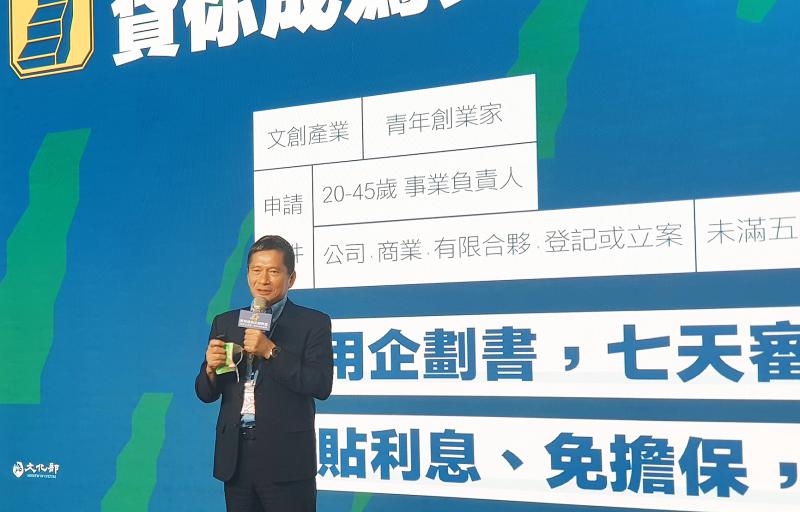The Ministry of Culture and the Taiwan Creative Content Agency yesterday launched a NT$10 billion (US$342.28 million) loan scheme with 10 participating banks to assist entrepreneurs aged 20 to 45 in the cultural and creative industries.
President Tsai Ing-wen (蔡英文) has introduced a policy to make available NT$60 billion in loans to help young people start businesses after the outbreak of COVID-19, Minister of Culture Lee Yung-te (李永得) told a news conference in Taipei.
Local banks used to be relatively unfamiliar with loans for cultural and creative businesses, and likewise, cultural and creative businesses are relatively inexperienced in working with banks, Lee said.

Photo: CNA
For this reason, the ministry asked the Executive Yuan to dedicate NT$10 billion of the NT$60 billion in loans to cultural and creative businesses, he said.
Cultural and creative businesses less than five years old and headed by people aged 20 to 45 can apply for the loans, the ministry said.
Applicants must have taken 20 hours of entrepreneurship courses, either in person or online, it said.
Entrepreneurs in the performing arts, bookstore, crafts, fashion design, animation, music, board game, illustration, magazine, curation, gallery and image licensing sectors, as well as up-and-coming YouTube and podcast creators, are among those who are eligible to apply, the ministry said.
The program offers various kinds of loans — such as up to NT$2 million for “start-up reserves” for businesses in their first eight months, or up to NT$12 million for capital expenditures — for which the government would provide credit guarantees of 80 to 95 percent, it said.
The credit guarantee is provided by the Small & Medium Enterprise Credit Guarantee Fund of Taiwan, it said.
For loans of less than NT$1 million, interest would be fully subsidized for five years, it added.
Participating banks are Bank of Taiwan, Chang Hwa Bank, Taiwan Business Bank, Land Bank of Taiwan, Mega International Commercial Bank, First Bank, Taiwan Cooperative Bank, Hua Nan Bank, Taipei Fubon Bank and Taichung Bank, the ministry said.
The ministry is to hold seminars nationwide to explain the loan scheme in detail, it said.
It has also set up a Web page with information about the program, including application forms, it added.

A preclearance service to facilitate entry for people traveling to select airports in Japan would be available from Thursday next week to Feb. 25 at Taiwan Taoyuan International Airport, Taoyuan International Airport Corp (TIAC) said on Tuesday. The service was first made available to Taiwanese travelers throughout the winter vacation of 2024 and during the Lunar New Year holiday. In addition to flights to the Japanese cities of Hakodate, Asahikawa, Akita, Sendai, Niigata, Okayama, Takamatsu, Kumamoto and Kagoshima, the service would be available to travelers to Kobe and Oita. The service can be accessed by passengers of 15 flight routes operated by

GIVE AND TAKE: Blood demand continues to rise each year, while fewer young donors are available due to the nation’s falling birthrate, a doctor said Blood donors can redeem points earned from donations to obtain limited edition Formosan black bear travel mugs, the Kaohsiung Blood Center said yesterday, as it announced a goal of stocking 20,000 units of blood prior to the Lunar New Year. The last month of the lunar year is National Blood Donation Month, when local centers seek to stockpile blood for use during the Lunar New Year holiday. The blood demand in southern Taiwan — including Tainan and Kaohsiung, as well as Chiayi, Pingtung, Penghu and Taitung counties — is about 2,000 units per day, the center said. The donation campaign aims to boost

ENHANCING EFFICIENCY: The apron can accommodate 16 airplanes overnight at Taoyuan airport while work on the third runway continues, the transport minister said A new temporary overnight parking apron at Taiwan Taoyuan International Airport is to start operating on Friday next week to boost operational efficiency while the third runway is being constructed, the Ministry of Transportation and Communications said yesterday. The apron — one of the crucial projects in the construction of the third runway — can accommodate 16 aircraft overnight at the nation’s largest international airport, Minister of Transportation and Communications Chen Shih-kai (陳世凱) told reporters while inspecting the new facility yesterday morning. Aside from providing the airport operator with greater flexibility in aircraft parking during the third runway construction,

American climber Alex Honnold is to attempt a free climb of Taipei 101 today at 9am, with traffic closures around the skyscraper. To accommodate the climb attempt and filming, the Taipei Department of Transportation said traffic controls would be enforced around the Taipei 101 area. If weather conditions delay the climb, the restrictions would be pushed back to tomorrow. Traffic controls would be in place today from 7am to 11am around the Taipei 101 area, the department said. Songzhi Road would be fully closed in both directions between Songlian Road and Xinyi Road Sec 5, it said, adding that bidirectional traffic controls would